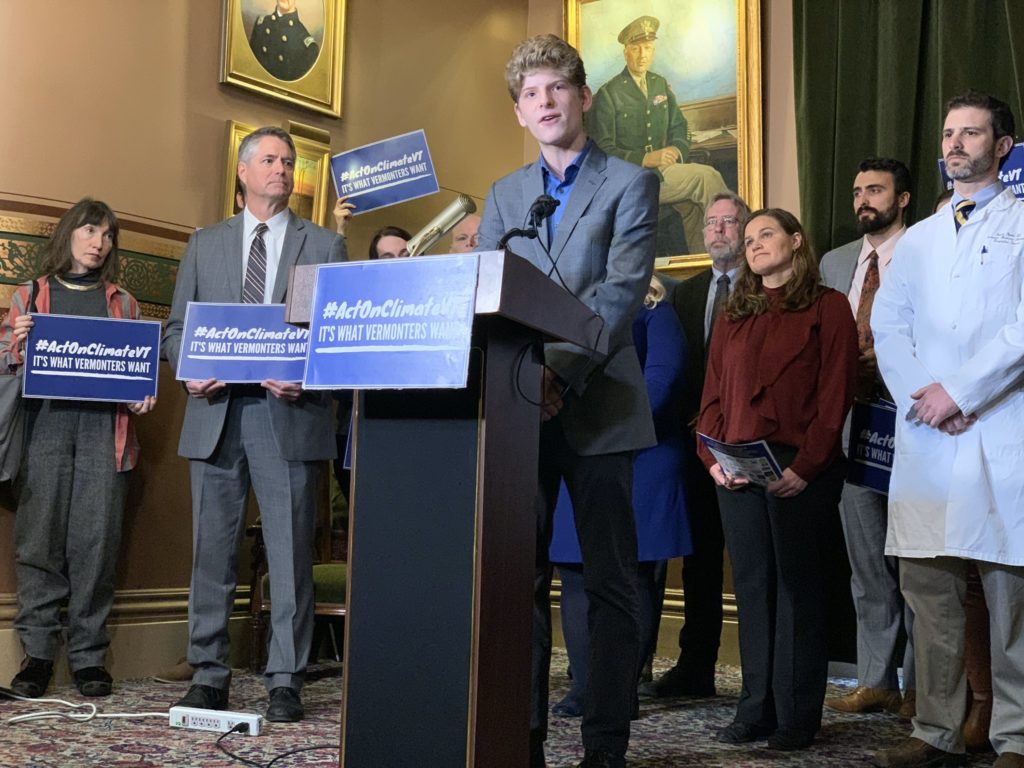Today at the Vermont State House, 30 Vermont organizations representing business, youth, poverty alleviation, public health, environment and other diverse interests presented a policy plan for climate action in 2020.
You can find the plan at www.actonclimatevt.org/s/2020-Climate-Platform.pdf.
The plan proposes a concise and essential platform for Vermont to do its part on climate change, while supporting a stronger economy and improving equity. The four legislative priorities for this 30-member coalition include:
- Enacting a Global Warming Solutions Act that enables and requires state government to achieve climate emissions reductions, by holding the state accountable to developing and implementing a plan that will meet our commitment to the Paris Climate Accord by 2025 and achieve net-zero carbon emissions by 2050
- Making a commitment to 100% renewable energy by 2030 to move our state infrastructure away from imported fossil fuels and strengthen our local economy.
- Modernizing Vermont’s energy efficiency utilities, enabling them to focus on reducing climate pollution through innovative new technologies while reducing the cost burden by helping low- and moderate-income Vermonters access cleaner, healthier, and more affordable heating and transportation solutions.
- Participating in a just, equitable implementation of the Transportation and Climate Initiative (TCI), a regional effort to reduce climate pollution by placing a cap on emissions from fossil fuel companies and using revenue raised to help participating states invest in cleaner transportation options.
“This platform, if enacted, will finally set Vermont on a path to meeting the goals our leaders have made clear they support,” said Ben Edgerly Walsh, Climate and Energy Program Director with the Vermont Public Interest Research Group (VPIRG). “We’ll still have far more work ahead of us, here in this building and around the state, but passing and enacting these policies will be a critical step towards taking this crisis seriously.”
“Climate action is a top priority for Vermonters, and this platform is intended to serve as a four-part strategic roadmap to ensure long overdue progress on this pressing issue,” said Johanna Miller, Energy and Climate Program Director at the Vermont Natural Resources Council (VNRC). “The stakes could not be higher, and we look forward to working as a coalition of 30 diverse partner organizations to ensure this platform is enacted into law.”
“This platform represents legislative actions we need in order for Vermont to change its trajectory and do its part on global warming,” said Lauren Hierl, Executive Director, Vermont Conservation Voters (VCV). “We have seen vocal support from a wide range of Vermont politicians about the need to meet our pollution reduction targets, and now it’s time to act on those pledges. The 2020 legislative session is the time to align state government around these vital efforts.”
“If you care about issues affecting low-income Vermonters, addressing the climate crisis is essential,” said Erhard Mahnke of the Vermont Affordable Housing Coalition. “That’s why we support this platform. Done right, climate action builds stronger communities and safeguards all Vermonters – especially our low-income neighbors — against the impacts that are on their way. Every policy in this platform can, and should, make Vermont communities from Burlington to Brunswick more resilient against the impacts of climate change.”
“There is no greater job-creating opportunity than moving Vermonters off of imported fossil fuels. And, in doing so, we can help mitigate the impacts Vermonters are already experiencing, which threaten our important farming heritage, our winter recreation economy, our maple industry and more,” said Jordan Giaconia, Public Policy Manager at Vermont Businesses for Social Responsibility (VBSR). “In the face of this growing crisis, Vermont businesses are working to advance solutions that recognize our shared responsibility to strengthen our economy and bring Vermont’s most vulnerable along in our climate future. We cannot afford inaction.”
“As the World Health Organization recently declared, global warming is the greatest threat to human health in the 21st century. And Vermonters are not immune,” said Dan Quinlan of the Vermont Climate and Health Alliance. “Climate change is already having tremendous impacts on the health of Vermonters, from the highly concerning increase in tick-borne Lyme disease to intensifying water-borne illness to emerging mental health concerns. Vermont has an obligation to do what we can to combat this looming crisis, and this package of 2020 climate-action priorities is fundamental to that progress.”
“I’m here as a member of the generation least responsible for the climate crisis, and the generation that will live with the consequences of continued inaction. I want to say this as clearly as I can: Governor Phil Scott and the Legislature are not doing enough to address the climate crisis,” said Seth Fisher-Olvera, a student from St. George who is a senior at Vermont Commons School.
“Our reliance on fossil fuels wrecks our air, our climate and our future. Instead we can get more electric vehicles on the road, maximize energy efficiency, and use far more clean, renewable power. This platform gets us there and ensures we do our part to leave a thriving Vermont for future generations,” said Sandra Levine, Senior Attorney with Conservation Law Foundation.
“The Sierra Club sees anything less than passing this climate action platform as a failure of the government to protect the health, safety and welfare of the state,” said Robb Kidd, Conservation Program Manager at the Vermont Sierra Club.
“Our birds and wildlife are relying on us taking climate action now,” said David Mears, Executive Director of Audubon Vermont. “We need to move quickly to address the risk that we will lose the Hermit Thrush and other iconic bird species from Vermont by adopting and investing in the achievement of this 2020 Plan for Climate Action,” he continued.
Read the 2020 Climate Plan for Climate Action in Vermont by visiting www.actonclimatevt.org/s/2020-Climate-Platform.pdf.

